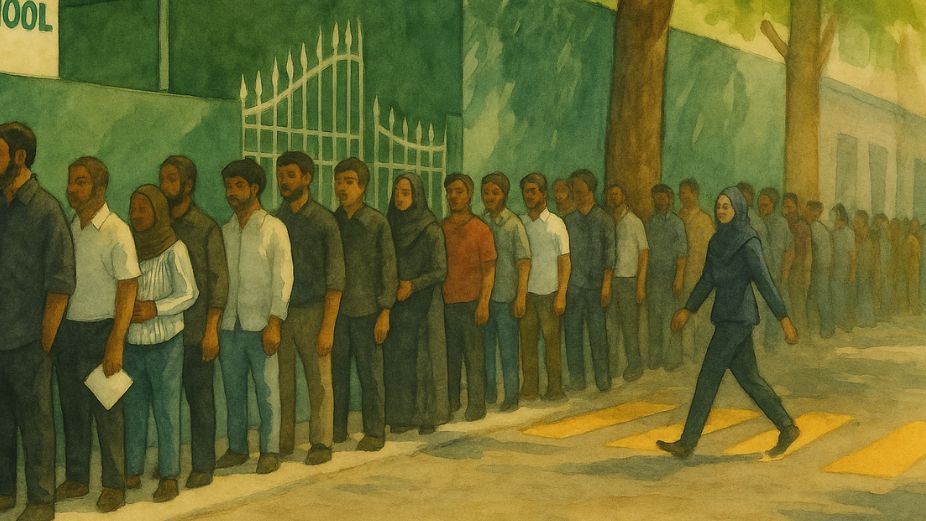
The recent turnout of nearly 1,000 young Maldivians for just 50 entry-level positions at the Maldives Immigration has reignited an ongoing conversation about youth unemployment—a structural issue that continues to cast a long shadow over the nation’s economic prospects.
While the scale of interest may signal high levels of public engagement, it simultaneously serves as a stark reminder of the disconnect between workforce supply and labour market demand.
The walk-in interview event, held at Galolhu School in anticipation of the new terminal opening at Velana International Airport, drew 876 applicants—of whom 758 met the eligibility criteria. Most were under 40. These were modest roles, reportedly offering salaries around MVR 10,000. Yet the overwhelming response is telling: the issue at hand is not a lack of willingness to work, but a persistent scarcity of viable employment pathways.
This reality is further underscored by the narrative often perpetuated in political and corporate circles—that local youth are uninterested in work or lack discipline. The queues that formed that day stand in direct contradiction to such claims.
Calls to Revive Small-Scale Industries on the Rise
Several social commentators and members of the public have emphasised the need to revive small-scale industries, identifying sectors such as food processing and garment manufacturing as sustainable avenues for economic development. These industries once held promise for providing meaningful employment across the atolls, yet today remain largely dormant or underdeveloped.
The overwhelming response to recent entry-level job openings highlights a deeper, systemic issue. Despite offering comparatively lower wages, public sector roles continue to attract high interest—largely due to their perceived stability, job security, and additional benefits such as weekends, public holidays, and, where required, overtime compensation. For a demographic facing limited access to stable income, these factors make public employment especially appealing.
A basic analysis of the Maldivian economy reveals a heavy dependence on tourism and fishing as its primary revenue streams. Yet even in these labour-intensive sectors, companies routinely rely on foreign workers—either through existing labour pools or by bringing in new employees from overseas —as part of long-term cost-saving strategies. The outcome? These key sectors, despite their demand for labour, are now saturated with migrant workers.
The argument for diversifying beyond tourism and fishing is, therefore, compelling. Revitalising alternative industries not only holds the potential to reduce dependence on imports and enhance food security, but also supports the long-standing goal of decentralised economic development—an ambition that has often been discussed but rarely realised. More importantly, such efforts must prioritise the local workforce, which has consistently demonstrated its willingness to work—provided the jobs offer fair wages and decent working conditions.
Employment Practices: Myths vs Reality
A recurring argument among some employers is that Maldivians exhibit a poor work ethic or a lack of commitment. Yet this generalisation does not withstand scrutiny. While there are instances of underperformance, as in any labour force, there are also countless examples of local employees who demonstrate capability and reliability.
The preference for hiring migrant workers is often based on perceived cost-efficiency. However, when one accounts for associated costs such as accommodation, meals, visa processing, and healthcare, the cost advantage is not always as significant as assumed. There is an opportunity here for employers to reassess the value proposition of investing in local talent.
A Moment for Strategic Reflection
From a business and policy standpoint, the lessons here are manifold. The Maldivian economy must evolve to absorb and retain the growing number of educated, capable young people entering the workforce each year. While macroeconomic development—such as infrastructure expansion and airport terminals—can stimulate job creation in the short term, they are not substitutes for comprehensive workforce planning and inclusive growth strategies.
The real challenge is not unemployment in isolation, but the misalignment between education outcomes, employer expectations, and the prevailing structure of the economy. A more coordinated approach involving the private sector, education providers, and policymakers is needed to create meaningful employment opportunities that match both the aspirations and capabilities of Maldivian youth.
For a country positioning itself as a premium destination and a progressive economy, the need to build a skilled, motivated and locally-anchored workforce has never been more urgent.












